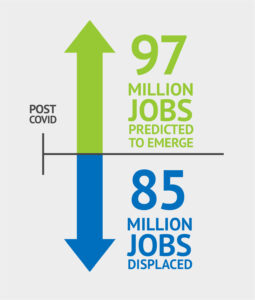The World Economic Forum recently released the third edition of its annual ‘Future of Jobs Report’. This yearly compendium helps many employers (as well as the market, at large) better understand the labor market and what the future of work looks like for millions around the globe. More specifically, the report maps the jobs and skills of the future, how fast they’re changing, and in what direction they’re traveling.
It would be difficult to skip past the combined health and economic shocks of 2020 and just how severely they’ve impacted the market. They’ve accelerated a variety of already growing technological trends including automation, remote work, and artificial intelligence, to name a few. The 163-page report serves as a timely reminder that it’s more important than ever to reskill and upskill the workforce.
Skill-Up Technologies has distilled the main takeaways for employers into this article.
Job Creation Slows, But Still Outpaces Job Destruction

The financial impacts of the COVID-19 recession combined with the increased pace of automation means that risk of disruption is high for an ever-growing number of fields. In fact, the report estimates that 85 million jobs may be displaced because of this disruption by 2025. What you may not have expected is that an estimated 97 million jobs are predicted to emerge that are better adapted to the new division between humans and machines.
Similarly, 41% of the employers surveyed for the report plan to expand their use of contractors for specialized work. Thirty-four percent of employers intend to expand their workforce altogether. Companies are reluctant to make use of layoffs and automation-based labor savings as their core workforce strategy. Surprisingly, nearly half of those surveyed prefer to internally redeploy displaced workers rather than cut their workforce.
The impact of these revelations is that for many employers, the ability to quickly reskill and upskill large parts of its workforce will become a short-term competitive advantage. Reskilling an assembly worker or financial analyst into a process automation specialist or fintech engineer might seem like a stretch at first. But with the abundance of professional development resources now available in tech, it doesn’t need to be. Even those without IT skills or experience now have comprehensive learning paths that serve as entry-points into the jobs of the future.
Everyone Needs Education
Another important revelation stemming from the report is that technology-based cross and upskilling isn’t limited to those in the IT space. Workers that would previously have been considered outside the influence of these emerging technologies will need continual learning resources to effectively manage the onslaught of new applications they’re driving. That’s because the report estimates that 40% of the core skills required to do a particular job will change by 2025. Two-thirds of the surveyed employers expect to see a positive ROI from upskilling and reskilling employees within one year.

Still, the window of time for employers to educate their employees is closing. Given the uncertainty of the economy and the labor market, as well as the significant skills gaps between redundant jobs and in-demand jobs, it’s in the best interest of employers to start developing their employee education programs as fast as possible.
Thankfully, most employers are aware of this. Sixty-two percent of the employers surveyed already provide access to programs that reskill and upskill their employees. That number will rise to 73% by 2025, in part because skill shortages are more acute in emerging professions. Roles that are increasingly in demand, such as data analysts and digital transformation specialists, are not easy to fill with readily available talent from labor markets.
Education Needs Differ Across Workers
There’s a surge in demand for workers who can fill technical roles in AI, big data, cloud computing, etc. But there’s also an increased demand for those who can fill roles in marketing, sales, content production, and jobs related to people and culture. Jobs that emphasize the importance of human interaction.
Employers should not neglect education for these types of roles. They should also consider the new environments many employees are likely to work from. 2020 saw a large-scale shift to remote work. While some will return to their offices once the health crisis is defeated, it’s unlikely that all will. Courses that focus on time management, listening skills, and even general wellbeing will help employees adapt to those new work arrangements.
This is already reflected in data from the report. Employed workers tend to place a larger emphasis on personal development courses, while those who are unemployed tend to focus on hard skills, such as data analysis, computer science, and information technology. Many employers expect employees to learn informally, on the job, as opposed to formal learning. This is a risky strategy given how quickly many employees will require significant upskilling or reskilling.
In Conclusion

The third edition of the Future Of Jobs Report comes at a time when the world is hit with significant socio-economic shocks. While job creation still outpaces job destruction, the window of time that employers have to reskill and upskill employees is closing. This is applicable for all employees, even those who are not at risk of displacement.
Employers, for their part, would be wise to avoid leaving it to chance. They should create educational programs for both soft and hard skills, while making sure that employees are engaging with those courses. Currently, this is not the case. The report shows that only 42% of employees take up employer-support educational opportunities; a fact often driven by an internal lack of expertise around the learning process and the type of blended learning strategies that are becoming synonymous with up and reskilling the workforce.
This is where a great learning partner can come into play. Skill-Up Technologies specializes in blended learning experiences for organizations working in the tech space. These include just-in-time and learning as a service strategies that will be key in mid-market and enterprise organizations successfully scaling their workforce to meet with tomorrow’s demand. Stay ahead of what’s coming. Contact us today to understand how we can help you.


